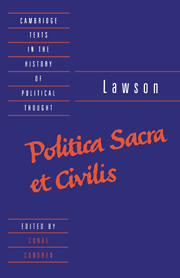Book contents
- Frontmatter
- Contents
- Preface
- Editor's introduction
- A note on the text
- Bibliographical guide
- Biographical notes
- Principal dates
- Politica Sacra et Civilis
- Epistle to the reader
- Dedicatory poem
- The arguments of the several chapters
- 1 Of government in general, and the original thereof
- 2 Of government in general, and of a community civil
- 3 Of an ecclesiastical community
- 4 Of a commonwealth in general, and power civil
- 5 Of the manner how civil power is acquired
- 6 Of power ecclesiastical
- 7 Of the manner of acquiring ecclesiastical power
- 8 Of the disposition of power civil, and the several forms of government
- 9 Of the disposition of ecclesiastical power: and first, whether it be due unto the bishop of Rome
- 10 Whether the civil state have any good title to the Power of the Keys
- 11 Whether episcopacy be the primary subject of the Power of the Keys
- 12 Whether presbytery or presbyters be the primary subject of the Power of the Keys
- 13 That the government of the church is not purely democratical, but like that of a free state, wherein the power is in the whole, not in any part, which is the author's judgement
- 14 Of the extent of a particular church
- 15 Of subjection in general, and the subjects of a civil state
- 16 Of subjects in an ecclesiastical polity
- Index
- Title in the series
10 - Whether the civil state have any good title to the Power of the Keys
Published online by Cambridge University Press: 05 June 2012
- Frontmatter
- Contents
- Preface
- Editor's introduction
- A note on the text
- Bibliographical guide
- Biographical notes
- Principal dates
- Politica Sacra et Civilis
- Epistle to the reader
- Dedicatory poem
- The arguments of the several chapters
- 1 Of government in general, and the original thereof
- 2 Of government in general, and of a community civil
- 3 Of an ecclesiastical community
- 4 Of a commonwealth in general, and power civil
- 5 Of the manner how civil power is acquired
- 6 Of power ecclesiastical
- 7 Of the manner of acquiring ecclesiastical power
- 8 Of the disposition of power civil, and the several forms of government
- 9 Of the disposition of ecclesiastical power: and first, whether it be due unto the bishop of Rome
- 10 Whether the civil state have any good title to the Power of the Keys
- 11 Whether episcopacy be the primary subject of the Power of the Keys
- 12 Whether presbytery or presbyters be the primary subject of the Power of the Keys
- 13 That the government of the church is not purely democratical, but like that of a free state, wherein the power is in the whole, not in any part, which is the author's judgement
- 14 Of the extent of a particular church
- 15 Of subjection in general, and the subjects of a civil state
- 16 Of subjects in an ecclesiastical polity
- Index
- Title in the series
Summary
Yet if the pope cannot have and hold this power, yet the princes, sovereigns and civil states, especially Christian, will assume it, and they have the strongest, and the surest way of all others, if they once get possession for to keep it, and that's the Sword. King Henry VIII did not only refuse to submit unto the Roman supremacy, but took it to himself and became within his own dominions, over all persons, in all causes, as well ecclesiastical as civil supreme head and governor. So the priest by the prince was divested of a considerable part both of his power and also his revenue. But whether he could be the proper subject of his spiritual power, or make good his title to it, was much doubted, and that by many. As king, he was but caput regni non ecclesia: and as such, he might have some civil, but no ecclesiastical power at all. Yet though it was called ecclesiastical, yet it was not such [grammatically but rhetorically], not properly but by a trope, a metonymy of the adjunct for the subject circa quod. For the power of a state temporal is only civil, if properly and formally considered; yet the civil sovereign had always something to do in matters of religion, concerning which it may make laws, pass judgement, and execute the same. Yet, the laws, the judgements, the execution were civil, not strictly ecclesiastical.
- Type
- Chapter
- Information
- Lawson: Politica sacra et civilis , pp. 131 - 136Publisher: Cambridge University PressPrint publication year: 1993



